
50 years of the Porsche 911 Turbo
Few three-word combinations carry as much promise as Porsche 911 Turbo. It rolls off the tongue and sounds as natural as toast and marmalade, but it wasn’t always so. The 911 was designed as a lightweight 2-litre 6-cylinder air-cooled sports car with room for two adults and two kids. So few, if any, potential buyers in 1965 weighed up the option of whether to buy a 911, or, say, a Ferrari 275 GTB. The two cars existed in different spheres of use, appeal, and price. When the mid-engined V12 Lamborghini Miura was launched in 1966 and super car suddenly became supercar, that void was even larger. Yet today we except, without question, that the 911 is a supercar, albeit one with a different take on that slightly nebulous concept. It has the performance, cachet and price tag to justify the label and has had for decades, even if it transcends the supercar clichés by being practical, reliable and easy to see out of. There is one reason for that transformation of perception and it’s the fitment of the turbocharger to the 911 in 1974, when the basic design was, remarkably, already over 11 years old.
The concept of a compressor, driven by the engine’s exhaust gas, which pressurises the air going into the combustion chamber and thus increases the power produced, was first developed in the 1930s. The first turbocharged road cars appeared in 1962, the Chevrolet Corvair Monza and the Oldsmobile Jetfire, and Porsche began experimenting with the technology on competition cars and prototypes in the late 1960s, before the 911 Turbo programme began in earnest in 1972. The development was overseen by Prof. Dr.-Ing. Ernst Fuhrmann, who had been one of Porsche’s first employees before leaving in 1956 and rejoining in 1971.
The 911 Turbo, the 930, first appeared at the Paris Motor Show in 1974. Its 3-litre, air-cooled, flat-six was fitted with a single KK&K turbocharger and produced 260bhp, giving it a 0-62mph time of 5.5 seconds. The new Turbo sported an enormous rubber-lipped whale tail and was 12cm wider at the rear. These modifications were essential to tame the high-speed handling. It was an immediate hit, with demand outstripping supply, but that didn’t stop Porsche from steadily developing it. In 1978 the engine was taken out to 3.3-lites which meant it achieved the magic 300bhp, although Porsche didn’t give it a 5-speed gearbox until 1989, just before the first generation 930 ceased production.
Ignoring the plethora of limited number homologation specials for various motor sport activities, the Turbo has remained the top 911 model ever since, with the 964-era Turbo making its debut in 1991 and receiving a 30bhp, 3.6-litre engine in 1993. The visually smoother 993 was launched in 1995. It proved to be the last iteration based on the original 1963 bodyshell – and also the last air-cooled Porsche – but featured two smaller turbos, one for each bank of three cylinders, and was a serious performance car as a result with 408bhp on tap. By the time production ended in 1998, when the basic design was 35 years old, it could be ordered with 450bhp. The water-cooled 996 continued the hierarchy with the Turbo making its debut in 2001, but by 2015 ‘Turbo’ had become a specification level because all 911s (except the GT3) received a smaller, more fuel- and emissions-efficient 3-litre turbocharged engine.
The entire history of the 911 is one of careful, thoroughly researched, evolution – in 52 years there have only been three new platforms including the original, and Porsche will surely continue in that manner because it has produced great cars and great profits. The current 911 Turbo S is, however, light years away from the original 930 and offers nearly 650bhp, a 0-62mph time of 2.7 seconds and a top speed of 205mph. That by any definition that is a super supercar.
The post 50 years of the Porsche 911 Turbo appeared first on My Car Heaven.
